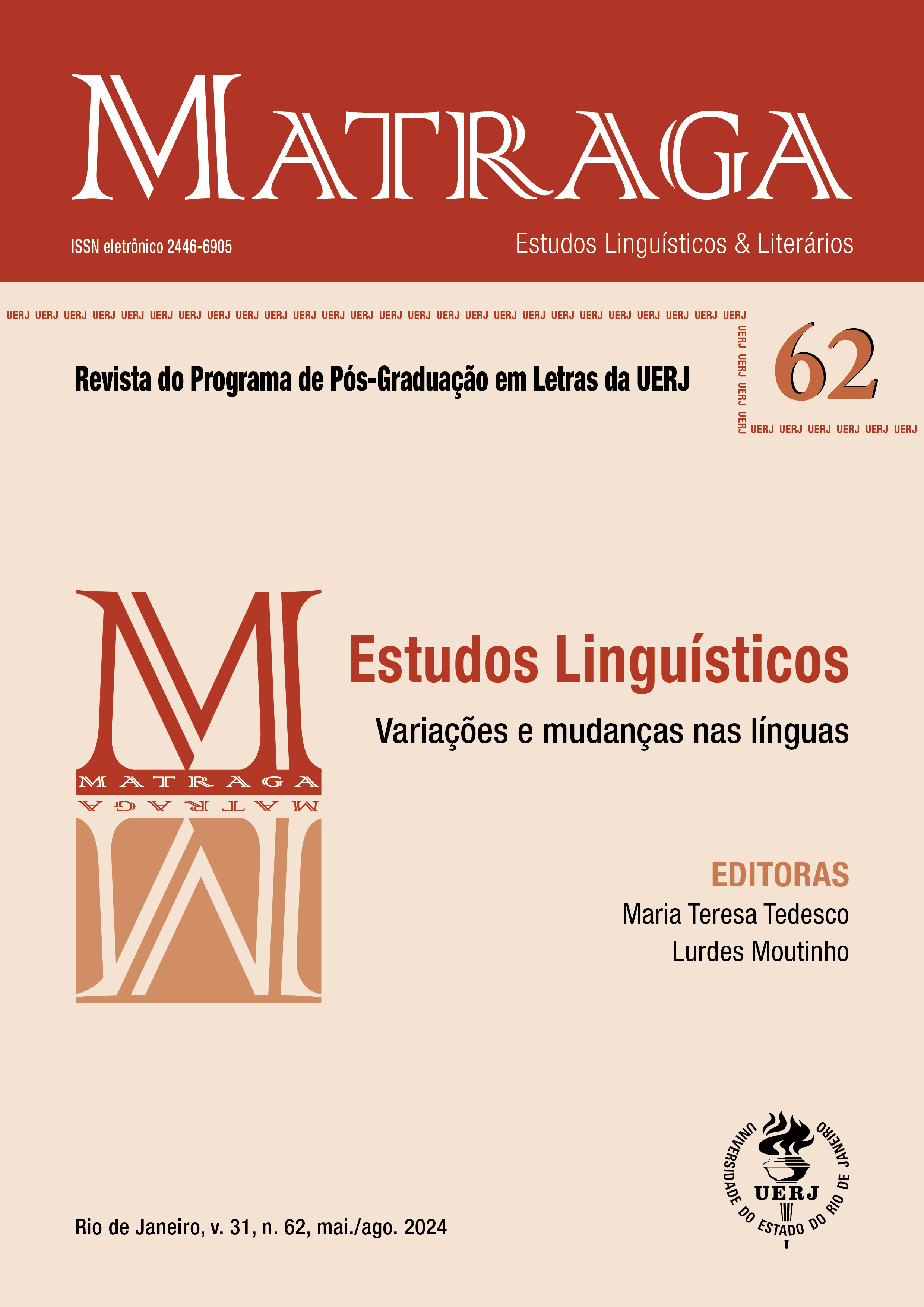A identidade refletida no code-switching em How to tame a wild tongue
DOI:
https://doi.org/10.12957/matraga.2024.79604Palavras-chave:
Code-switching, Hibridismo, IdentidadeResumo
Esta é uma pesquisa bibliográfica que almeja analisar o code-switching que ocorre no capítulo How to tame a wild tongue de Borderlands/La Frontera: The New Mestiza (1987), considerando a sua relação com o princípio de identity-reflective code-switching, em alguns trechos, além de contextualizar as situações em que era possível observar essa alternância de línguas e os tipos de code-switching no texto. O estudo teve condução qualitativa e quantitativa e foi baseado nas teorias de Poplack (1980) e Lo (2007). Para a obtenção dos dados, foram analisados trechos nos quais a Gloria Anzaldúa alternava línguas no capítulo em questão, em comparação às categorias que seriam analisadas. Os resultados mostraram que a autora usava o code-switching como uma ferramenta para demonstrar quem ela era e sua conexão com mais de uma língua.
---
Original em inglês.
Downloads
Referências
ANDRADE, Manoel. Los Chicanos. Hispanista, v. 14, n. 52. p. 1-13, 2013.
ANZALDÚA, Gloria. Borderlands/La Frontera: the new mestiza. 1. ed. San Francisco: Aunt Lute Books, 1987.
AUER, Peter. The Pragmatics of Code-switching: A Sequential Approach. In: MILROY, Lesley; MUYSKEN, Pieter (Orgs.). One Speaker, Two Languages: Crossdisciplinary Perspectives on Code-switching. Cambridge: Cambridge University Press, 1995, p. 115-135.
BHABHA, Homi K. The location of culture. Routledge: London/New York, 1994.
BERNIUS, Micaela. Linguistic Terrorism in Borderlands, Comfort Woman, and The Handmaid’s Tale. In: UNIVERSITY OF NORTH GEORGIA ANNUAL RESEARCH, XXIII 2015. Collection. Dahlonega: Uni¬versity of North Georgia, 2018. Retrieved from: <https://digitalcommons.northgeorgia.edu/cgi/viewcontent.cgi?article=1843&context=ngresearchconf>. Access date: Sep. 22, 2022.
BERRY, Alaina. The Effects of Code-Switching: How Bless Me, Ultima Explores Chicano Culture and American Identity. Undergraduate thesis (Bachelor in English) – Ashland University, Ashland, 2015. CANTONE, Katja F. Code-switching in bilingual children. Dordrecht: Springer, 2007.
EXTRA, Guus; VERHOEVEN, Ludo. The cross-linguistic study of bilingual development, 1994.
HALL, Stuart. Cultural Identity and Diaspora. In: WILLIAMS, Patrick; CHRISMAN, Laura (Orgs.). Colonial discourse and post-colonial theory. Routledge, 2015. p. 392-403.
KOBAN, Didem. Intra-sentential and inter-sentential code-switching in Turkish-English bilinguals in New York City, US. Procedia-Social and Behavioral Sciences, v. 70, p. 1175, 2013.
LO, Kwan Ngai Vivian. Cultural identity and code-switching among Chinese immigrant students, parents and teachers. Doctoral Thesis (Faculty of Education) – Burnaby, Simon Fraser University, 2007.
MENA, Mike. Linguistic terrorism/”How to tame a wild tongue” by Gloria Anzaldúa (1987). YOUTUBE, New York, Nov. 22, de 2021. Retrieved from: <https://www.youtube.com/watch?v=hn-S6Ky4eUU>. Acess date: Jul. 01, 2022.
MIKAHAL, Iyad Ahmad Hamdan. Code switching as a linguistic phenomenon among Palestinian English Arabic bilinguals with reference to translation. Master thesis (Master of Applied Linguistics and Transla¬tion) – An-Najah National University, Nablus, 2016.
NAVARRO, Michelle. Moving Beyond the Chicano Borderlands. YOUTUBE, Dallas, Nov. 04, 2018. Re¬trieved from: <https://www.ted.com/talks/michelle_navarro_moving_beyond_the_chicano_borderlands>. Acess date: Feb. 14, 2022.
MOZZILLO DE MOURA, Isabella. Motivações para a alternância de código no discurso bilíngue. Trabalhos de Linguística Aplicada, p. 51-67, 1997a.
MOZZILLO DE MOURA, Isabella. Traição linguística e lealdade cultural. A alternância de código no discurso bilíngue. Master’s thesis (Master of Arts) – Universidade Católica de Pelotas, Pelotas, 1997b.
SCOTTON, Carol Myers. Social motivations for codeswitching: Evidence from Africa. New York: Claren¬don Press, 1993.
POPLACK, Shana. Sometimes I’ll start a sentence in spanish y termino en espanol: toward a typology of co¬de-switching. RESEARCH GATE, New York, January 1980. Retrieved from: <https://www.researchgate.net/publication/249932906_Sometimes_I’ll_start_a_sentence_in_Spanish_Y_TERMINO_EN_ESPANOL_toward_a_typology_of_code-switching_1>. Acess date: May 07, 2022.
POPLACK, Shana. Code-switching: linguistic. In: SMELSER, Neil J.; BALTES, Paul B. (Orgs.). International encyclopedia of the social and behavioral sciences. New York: Elsevier, 2001, p. 2062-2065.
RUMBERGER, Russell W.; LARSON, Katherine A. Toward explaining differences in educational achievement among Mexican American language-minority students. Sociology of education, p. 68-92, 1998.
SCHALL, Janine. Codeswitching: Why Do It? WORLDS OF WORDS, Edinburg, May 15, 2012. Available at: < https://wowlit.org/blog/2012/05/15/codeswitching-why-do-it/>. Acessed: Jul. 02, 2022.
SCHMIDT, Margaret. The limitations of code switching in Chicano/a literature. Young Scholars in Writing, v. 8, p. 40-51, 2011.
SULLIVAN, Major Patrick. Manifest injustice: a critical analysis of the Mexican-American war. Master‘s thesis (Master of Defence Studies) – Canadian Forces College, Toronto, 2012.
TEEMANT, Annela. & Pinnegar, Stefinee E. Understanding Language Acquisition Instructional Guide. Provo: Brigham Young University-Public School Partnership, 2007.
Downloads
Publicado
Como Citar
Edição
Seção
Licença

Este trabalho está licenciado sob uma licença Creative Commons Attribution-NonCommercial 4.0 International License.
AUTORIZAÇÃO
A Matraga – Revista do Programa de Pós-Graduação em Letras da UERJ está autorizada a publicar o artigo ora submetido, caso seja aceito para publicação online. Fica atestado que a contribuição é original, que não está sendo submetida a outro editor para publicação, e que a presente declaração é a expressão da verdade.
Os trabalhos publicados no espaço virtual da Matraga – Revista do Programa de Pós-Graduação em Letras da UERJ serão automaticamente cedidos, ficando os seus direitos autorais reservados à Matraga. Sua reprodução, total ou parcial, é condicionada à citação dos autores e dos dados da publicação.

A Matraga utiliza uma Licença Creative Commons - Atribuição-NãoComercial 4.0 Internacional.





